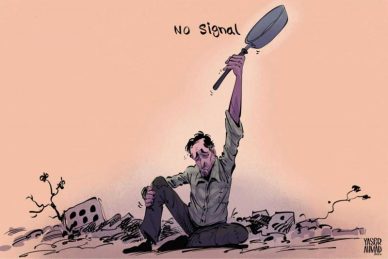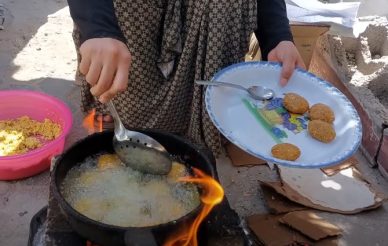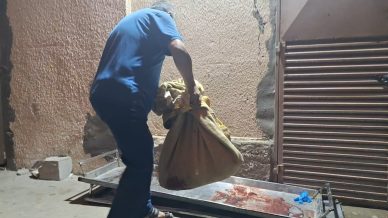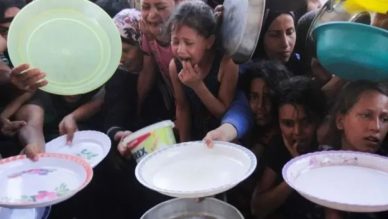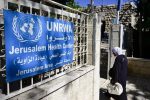GAZA, (PIC)
Dua’a Ismail is perplexed about how to care for the diet of her first child, with the loss of all healthy foods from the markets in the northern Gaza Strip due to the siege imposed by the Israeli occupation army on the population for 300 days of the war of genocide.
Dua’a gave birth to her first child (Rayan) just weeks before the war broke out, and she says that over the past months she has relied on breastfeeding and some solid foods that the child consumes after reaching the sixth month.
On how she secured these foods, she said that her husband had saved some money, and when he saw that Gaza was approaching famine after the occupation army denied entry of all kinds of vegetables or fruits, he tried to secure as much food as possible for his child, such as buying many cans of formula milk, cereals, and oats, and storing a few kilograms of dates.
But today she stands helpless before her child and his need to consume eggs and full-fat milk, as they contain larger quantities of the calcium necessary for the growth of teeth and bones at this stage of his life.
Dua’a points out that she has repeatedly tried to feed him eggs, but each time he vomits what he eats, and she believes that he is not accepting the taste of eggs, which he was supposed to start consuming in the sixth month of his life, when eggs were completely absent from the market.
She adds that eggs are available in the market in very scarce quantities and are sold at a very high price, as one egg is sold for 15 shekels. “I cannot buy eggs at this price on daily basis assuming that he would accept them,” she said, adding, “we are barely managing our food needs.”
Special foods
While Youssef Al-Haddad expresses great concern for his 3-year-old daughter, who has been recently diagnosed by doctors as suffering from anemia due to a lack of the iron element necessary for the production of the “hemoglobin” protein.
The illness was discovered after his child lost consciousness on a very hot day. “That day, we noticed paleness on her face, general fatigue, and we thought it was due to the high humidity, which is common in the summer. But when she lost consciousness and we took her to the hospital, the tests showed low hemoglobin levels.”
In general, the consequences of anemia vary among children. The disease can affect school performance due to growth delays and behavioral disorders such as decreased physical activity, social interaction, and attention to tasks. In severe cases, anemia can cause cognitive and motor developmental delays in children.
The father is unable to afford what the doctors advised him to do to prevent the condition from worsening in the future, as the markets only have canned products like beans, peas, chickpeas, and processed meats, all of which are harmful and not recommended for anemia patients, who need fresh vegetables and red meat in particular.
He explains that vegetables and fruits are almost non-existent in the market, and what is available is sold at prices he could not have imagined.
The father displaced to the city of Rafah in the south of the Gaza Strip last November, then repeatedly displaced to Mawasi Khan Yunis and then to Deir al-Balah, explaining that the repeated displacement has exhausted them and deprived them of the limited financial resources he had, as he works as a government employee and barely earns a few hundred shekels, which is not enough to secure food.
While the occupation army continues to besiege Gaza for 10 months, and prevents relief organizations from bringing enough food into the sector, Al-Haddad says he has no choice but to wait and deal with the reality according to his capabilities, expressing his sadness and grief as he sees the misery on the faces of hundreds of fathers who are unable to do anything for their sick and hungry children.
Severe food insecurity
The United Nations food agency warns that southern Gaza may soon witness the same disastrous hunger levels previously recorded in the north, where the occupation forces focused their military attack in the early days of the war of extermination.
According to data published by the United Nations Relief and Works Agency for Palestine Refugees (UNRWA), more than 50,000 children need treatment for severe malnutrition.
Adele Khodr, UNICEF Regional Director for the Middle East and North Africa, says the risk of increasing malnutrition cases is accompanied by the collapse of treatment services, “Today, only two centers out of the three centers that treat children suffering from severe malnutrition in the Gaza Strip are operating.”
She points out that plans to open new centers have been delayed due to the continued Israeli military aggression throughout the enclave, explaining that treating a child from severe malnutrition usually requires 6 to 8 weeks of continuous care and requires special therapeutic foods, safe water, and additional medical support.


